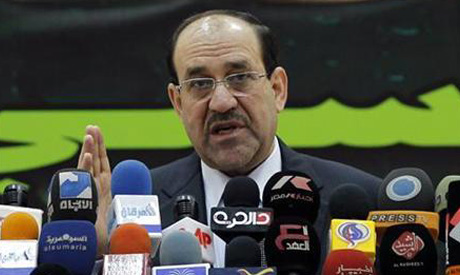
Iraq's Prime Minister Nuri al-Maliki speaks at a ceremony to mark the birth anniversary of Prophet Mohammed at Um al-Qura in Baghdad February 15, 2011. (Photo:Reuters)
The Arab League said Saturday that it expects Syria to agree soon to allow observers to monitor the protection of civilians in the country.
In parallel, Baghdad announced that an Iraqi delegation was in Damascus for talks on a peace initiative, while Tunisia is hosting a meeting of Syrian opposition groups.
Arab League deputy Ahmed Ben Helli said "positive signs" were received from Damascus, a day after 19 civilians were killed in mass demonstrations urging a hastened Arab response to a bloody nine-month crackdown on anti-government protests.
Speaking ahead of an Arab League ministerial meeting on the Syrian crisis being held in Qatar, Ben Helli told AFP that "there are positive signs ... I expect the signing will happen soon."
"It will not be today," he added.
Saturday's meeting had originally been scheduled to take place in Cairo alongside a now indefinitely postponed emergency foreign ministers meeting.
Ben Helli said the Syrian side would not be attending, but that Saudi Arabia would be represented, in addition to Algeria, Egypt, Oman, Sudan and hosts Qatar.
Saudi Foreign Minister Prince Saud Al-Faisal is in Doha for the meeting.
Announcing the postponement on Thursday, Ben Helli said talks would continue with the Syrian government to try to convince it to implement an Arab plan to end the bloodshed.
On November 27, the Arab League approved a raft of sanctions against the Damascus regime to punish its failure to heed an ultimatum to admit the observers. But on Sunday, Syria said it would allow the mission in, on certain conditions.
In a letter to Arab League chief Nabil Al-Arabi, Foreign Minister Walid Muallem set out a number of terms, notably the end of Arab League sanctions.
Meanwhile, an Iraqi delegation arrived in Damascus to present a proposal by Baghdad to end months of unrest, two days after Prime Minister Nouri Al-Maliki said he would present an initiative to Damascus.
Iraqi National Security Advisor Falah Al-Fayadh travelled to Damascus "to meet with the Syrian authorities to discuss the Iraqi peace initiative," Maliki media advisor Ali Mussawi told AFP.
The initiative is aimed at opening up dialogue between the opposition and the Syrian government to reach a result that satisfies both sides, Maliki said in interview with AFP Thursday.
In the meantime, Western nations said Russia's surprise draft resolution at the UN Security Council should contain a stronger condemnation of rights violations by the Bashar Al-Assad government and stronger support for Arab League action against Syria.
The proposed resolution strongly condemns violence by "all parties, including disproportionate use of force by Syrian authorities." It also raises concern over "the illegal supply of weapons to armed groups in Syria," according to a copy obtained by AFP.
Russia said it would not be calling for negotiations in the UN Security Council before Monday.
Tunisia, meanwhile, is hosting a three-day meeting of Syrian opposition movements formed before and since the launch of the Syrian uprising, which the UN says has left 5,000 people dead.
On Friday, 19 civilians were shot dead by security forces, the London-based Syrian Observatory for Human Rights said, as hundreds of thousands protested to condemn the Arab League for failing to take tougher action against the Assad regime.
"The Arab League is killing us — enough deadlines," was the slogan of the protests.
The Observatory said more than 200,000 protested in the besieged central city of Homs alone, venting their frustration at the Arab League.
Demonstrators also took to the streets of Damascus and the protest hubs of Daraa, Deir Ezzor and Hama, according to the Local Coordination Committees, which organises the protests.
Short link: